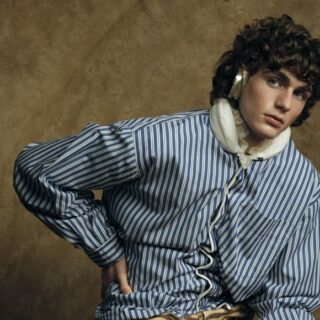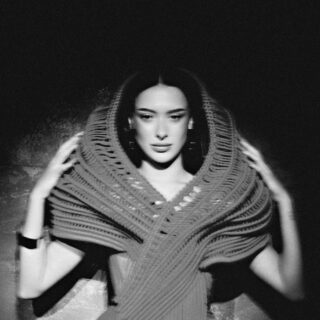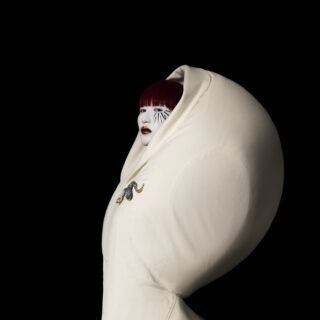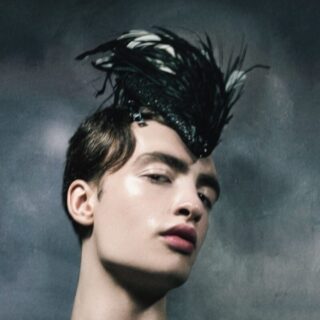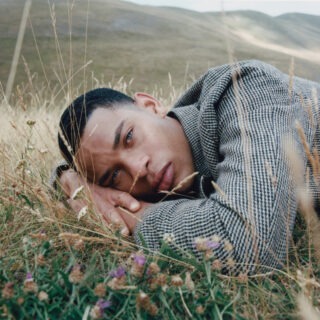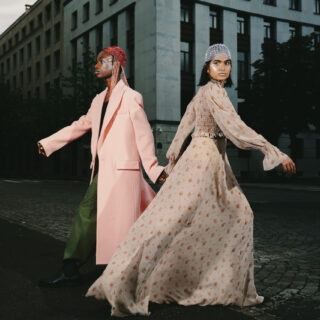photography. Ben Abarbanel
fashion. Yana Echko
issue 9. infinity
Could you share your advice for young women striving to balance multiple responsibilities—career, motherhood, health, and relationships—and what has helped you navigate life’s challenges?
As I wrote in my book, life consists of different stages. When you have babies, they become your main focus. As a career woman, it’s important to wait until your children need less of your attention and start going to school. Regarding health, I believe in following science and common sense, such as adhering to the Mediterranean diet instead of succumbing to fad diets. When it comes to relationships, I learned the hard way. I got divorced at 31 and struggled to find a partner I would want to share my life with. It’s essential to be with someone who treats you as well as you treat them and makes you feel happier than you do alone. If not, consider getting a dog; they will love you unconditionally.
You’ve been a vocal advocate against ageism in fashion. How have attitudes towards older models evolved in your career, and what steps should the industry take to promote greater age diversity and inclusivity in the future?
I didn’t anticipate leading in the fashion industry at 76; I simply continued modeling. The haute couture opportunities only began to emerge in my late 60s, largely thanks to social media. I recommend that everyone utilize social media to share their achievements to remain relevant in both work and society. The industry won’t inherently promote age diversity unless we raise awareness about our talents and push for change.
In our story, you’ve been photographed wearing brands like LUKS by Sandra Luks, AMAG By Nolys Rodríguez, The Scarab Lab, and EB Denim, which are known for using recycled fabrics. How important is sustainability to you in your fashion choices?
I am very happy to model recycled fabrics because sustainability is crucial. We must take steps to save our planet. After wearing many of my clothes, I donate them to women in need, and they are always excited to wear them and share them with their families. This practice not only promotes sustainability but also brings joy to those who receive them.
Denim is often seen as a timeless piece. How do you incorporate denim into your style, and what does it represent for you?
I absolutely love wearing denim. It’s versatile enough for casual outings, like walking my dog, and can easily be dressed up for an evening dinner with friends. By simply changing my blouse or shoes, I can transform my look while feeling comfortable and stylish. For me, denim represents freedom and adaptability; it’s a fabric that allows me to express my personality in various settings.
What advice do you have for women who may feel pressured by societal standards of beauty and age, especially within the harsh fashion industry environment?
Why should women feel pressured? The pressure often comes from external expectations that don’t truly reflect our worth. Instead of succumbing to these standards, we should celebrate our individuality and let the world know how great we are. Social media is a powerful tool for showcasing talent and achievements. When faced with rejection, it’s important to keep pursuing what you love and to promote your career without losing confidence in yourself.
shoes. Azalea Wang | earrings. Ciner NY | bracelet. Weiss | brooch. Kenneth Jay Lane
You’ve appeared on the cover of Sports Illustrated’s Swimsuit Issue at 74, challenging stereotypes about aging and beauty. What message do you hope to convey through such milestones?
I was thrilled to be featured on the cover of Sports Illustrated—it was completely unexpected. Being photographed in a swimsuit was a new experience for me, and I want to send a clear message: women are often our own worst critics. While men seem to have no problem wearing swimsuits at any age and size, women should feel empowered to embrace their bodies as well. We need to stop worrying about criticism and instead focus on celebrating our beauty and confidence at every stage of life.
What are your hopes for the fashion industry’s future, and how do you envision your role within it?
I believe that, with the rise of social media, the fashion industry is poised for significant growth and transformation. I see myself as an integral part of this evolution. I dedicate about four hours every day to crafting posts filled with beautiful photos and inspirational messages. It’s a process that anyone can embrace, though it does require time and effort. Mistakes will happen along the way, but they are valuable learning experiences that contribute to our growth.
Despite your remarkable career achievements, you’re often referenced as “Elon Musk’s mother.” How do you navigate and redefine this narrative while maintaining your individual identity and professional accomplishments?
I am incredibly proud of Elon, as well as my other children, Kimbal and Tosca. We all believe he deserves every accolade he receives because he is truly remarkable. While his name certainly attracts attention to articles, I’ve come to accept that as part of my narrative. When readers dive into the content, they discover my work in nutrition, public speaking, modeling, and my book. I’m comfortable with this dual identity, as it allows me to celebrate both my family and my professional achievements.
words. Odie Senesh
photography. Ben Abarbanel
art direction. Odie Senesh
fashion. Yana Echko
talent. Maye Musk
talent manager. Anna Sherman
hair. Kazuto Shimomura
make up. Clara Rae
photography assistant. Jose Martom
fashion assistants. Maksim Mizgirev + Inga Levin
hair assistant. Narumi
production. Liya Eliazar
location. 30thStreet Studios
© Schön! Switzerland. All rights reserved.

